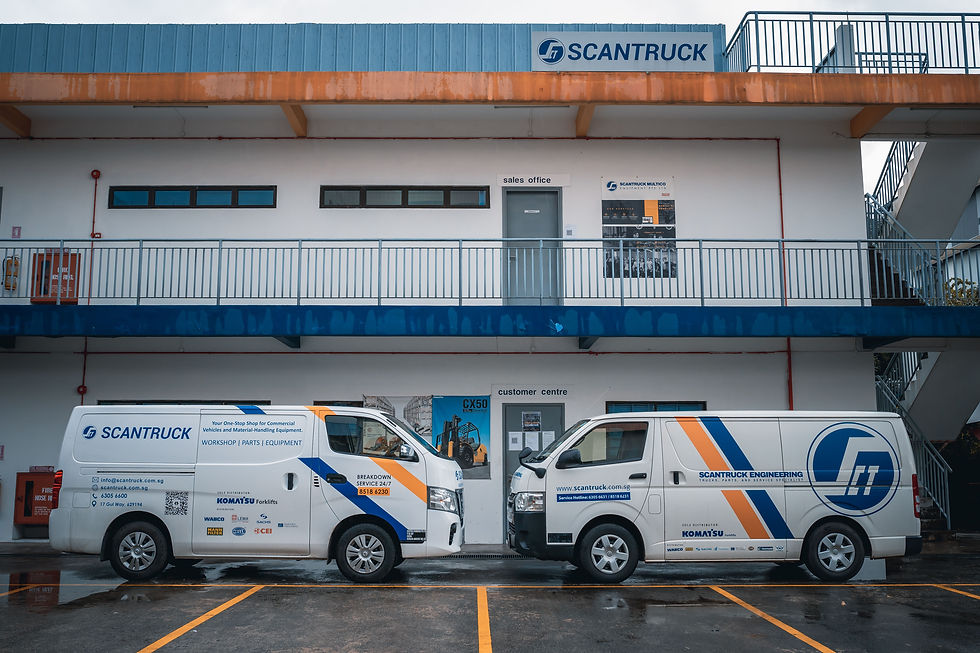8 Proven Strategies to Lower Your Fleet Expenses in Singapore
- scantruckshared
- Jan 20, 2023
- 3 min read
Updated: Jan 31, 2024

Managing and operating a fleet in Singapore can become exceedingly costly if not properly controlled.
For fleet companies in Singapore, cost management is paramount. Most business owners understand that profitability hinges on increasing sales and reducing expenses. Unfortunately, the implementation often lags behind the understanding, leading to unnecessary financial losses.
To aid in this, we've compiled eight tested strategies to help reduce your fleet expenses in Singapore:
1.Minimise Repair and Maintenance Costs
In Singapore, when a vehicle breaks down, it can lead to significant expenses. Reports suggest that fleet trucks should ideally only experience breakdowns after 16,093 km, but breakdowns are occurring much sooner. The repair and maintenance costs can range from S$500 to S$2,000 per truck monthly, with additional costs for trailer maintenance.

Implementing preventive maintenance is crucial to avoid unexpected breakdowns. Emerging fleet management technologies, such as Shell Telematics or IFTA Plus, enable drivers to report vehicle issues promptly, thus reducing repair costs. More tips on reducing maintenance costs can be found in our detailed guide.
2. Optimise Fuel Consumption
Fuel costs are a major expenditure for fleet companies in Singapore. A survey revealed that 53% of fleet companies exceed their budgeted fuel allocations annually. Factors contributing to this include inefficient route planning, traffic congestion, and poor driver behaviour.
Using data to track and improve fuel consumption is essential. For instance, tracking idle time, which can amount to significant costs annually, can help in taking effective measures to reduce fuel wastage.

3. Secure Favourable Insurance Premiums
Insurance premiums in Singapore are influenced by various factors, including your fleet's safety record. Insurance costs for vehicles, such as prime movers and trailers, depend on their age. Improving your fleet’s safety record through measures like installing dash cams and monitoring driver behaviour can help in reducing insurance premiums.
4. Avoid Traffic Violations and Fines
In Singapore, traffic violations can lead to hefty fines and a tarnished company reputation. Penalties for common violations can range significantly, and repeated offences can result in severe fines. Complying with Land Transport Authority (LTA) rules and regulations is essential to avoid these unnecessary costs.
5. Efficient Parts Inventory Management
Effective parts inventory management in your maintenance program can lead to cost savings. Ensuring the availability of regularly used parts reduces vehicle downtime and maintenance costs. Conversely, stocking rarely used or obsolete parts can lead to increased inventory expenses.

6. Consider Fleet Leasing and Management
Leasing vehicles through a reliable fleet management company can be more cost-effective than outright purchasing. Leasing offers financial advantages such as lower monthly payments and can free up capital for other business aspects.

7. Reduce Lifecycle Costs
Frequent vehicle replacement can be costly and impact the overall fleet budget. However, retaining vehicles beyond their optimum economic life can lead to increased fuel and maintenance costs. Adopting a replacement planning tool to determine the appropriate lifecycle for replacing a vehicle can help in reducing these costs.
8. Improve Communication among Stakeholders
Effective communication between all parties involved in fleet management is crucial. Regular interaction among departments, technicians, drivers, and service providers ensures a cost-effective fleet maintenance program, enabling timely maintenance and cost reduction.




Comments